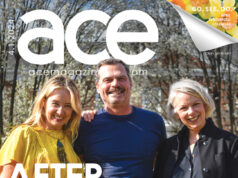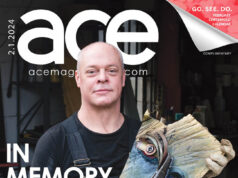“When we were recording, everything was in place. It was so easy to play those songs.”
—Alejandro Escovedo on ‘Street Songs of Love,’ recorded in Lexington
Alejandro Escovedo’s 2008 album, Real Animal, was an autobiography of bands told through geography; San Francisco, Los Angeles, New York (and its storied Chelsea Hotel) and his longtime home base, Austin, Texas, were among the points that figured in this travelogue.
For his follow-up, Street Songs of Love, Escovedo again uses geography as an autobiographical jumping-off point. For this album, he and producer Tony Visconti once again returned to Lexington, and recorded the album over twelve days here. The material was developed over a two-month stint of Tuesday nights at Austin’s Continental Club and then road-tested for a few weeks before they came to Lexington. The title song thrums with the pulsating rhythms of the South Austin street that inspired it. But that heartbeat of a street also serves as a metaphor for the insistent heartbeat of a man who, at 59, has faced down death and gone on to scale new career peaks.
Not only did critics call Real Animal his best album ever; it also scored him a spot on the roster of Jon Landau Management, whose only other current client is Bruce Springsteen. That led to Springsteen’s vocal contribution to “Faith,” a cut on Street Songs—and to his impromptu summer appearance when Escovedo and his band played the Stone Pony in July, a day after appearing on Letterman.
“I feel love for a lot of people. I feel love for humanity, really. The world and the universe,” Escovedo admitted during a recent interview. “But this individual thing has always been troubling for me.”
He’s gone through several marriages and divorces, including one in which his wife committed suicide after they separated. Along the way, he fathered seven children—six girls and one son, whom he struggled to raise while remaining committed to a career that put him on the road more days than he was home, first in bands like the Nuns (the offshoot of a college film project about a band that couldn’t play, it became an actual band), Rank and File, the Setters, the True Believers, Buick MacKane, and as a solo artist.
He also had to go years before his recent bump toward mainstream musical acceptance, despite being revered not only by long-time fans, but a long list of fellow musicians. After a life-threatening battle with hepatitis C in 2003, so many musicians clamored to join in on a fundraising tribute album, Por Vida, it became a double disc. Lucinda Williams, John Cale, the Jayhawks, Son Volt, Los Lonelyboys, Steve Earle, Ian Hunter, M. Ward, were among the contributors who wanted to acknowledge Escovedo’s contribution to American music.
In 1998, No Depression magazine named him as its Artist of the Decade—even though the decade wasn’t done. In 2006, the Americana Music Association gave him its Lifetime Achievement Award for Performing. All of that happened before Real Animal and Street Songs, both created with the help of co-writer Chuck Prophet and producer Tony Visconti (David Bowie, T. Rex).
A dissection of love in its various forms, Street Songs is an album full of powerful rockers and affecting ballads that evolves and expands on the elements that made Real Animal a critical favorite.
The cuts on Street Songs, Escovedo said, address everything from the love of a father and son (“Down in the Bowery,” inspired by his and 18-year-old son Paris Diego’s shared love of the Ramones) to “the ghosts that haunt someone’s bed” (“This Bed is Getting Crowded,” which seems to chronicle a relationship breakdown).
“‘Anchor’ is a song about hoping to find love to keep you grounded when you feel like you’re drifting away,” he said. “I think that line, ‘I’m in love with love/and it broke me in two,’ it’s probably the most honest thing I’ve ever said in a song.”
Asked whether he means he’s in love with the idea of love or with being in love, or both, he admitted he’s not sure.
“You think you’re in love, you think you’ve found love, and then when it comes crashing down on you, becomes something else entirely, I wonder what it was I felt,” he confessed.
He’s far more sure about the love expressed in “Bowery,” which conveys his hope for the shy hip-hop and graffiti fan who, Escovedo said, thinks his dad makes “music for old people.”
“I want to see you out on the street/makin’ a scene for everybody,” the chorus goes. “I want to hear your voice up above/the crowd and the noise/down in the Bowery.” In addition to gospel-influenced backing vocals, it also features vocals by Ian Hunter, doing his best Rod Stewart.
“He loves it,” Escovedo reported of Paris’ response. “… He gave me that smile that I love so much. And I could tell that he was happy that I had done it for him. I think it meant a lot to him. And that’s a big deal for me.”
Escovedo and his band, the Sensitive Boys, worked out the album’s songs at Austin’s famed Continental Club on South Congress Avenue. They did raw versions, then honed them as the audience listened.
“It just gave us an immense amount of confidence,” Escovedo said of the process. “When we were recording, everything was in place. It was so easy to play those songs.”
They then recorded at St. Claire Recording Co. here, where Real Animals also was done. Springsteen didn’t join them in the studio. But his contributions to “Faith,” a sizzling rocker, are still spot-on.
That collaboration is the biggest manifestation so far of his Landau connection. In April 2008, it landed Escovedo onstage with Springsteen in Houston, performing Real Animal’s “Always a Friend.” Their duet was included on a tour EP Springsteen released. Since then, Escovedo has had some other high-profile moments, including opening for Hillary Clinton at the National Democratic Convention. In June, the son of a one-time prizefighter from Mexico sang “The Boxer” with Willie Nile at a Simon & Garfunkel tribute in Central Park. That was right after he taped his fourth “Austin City Limits” performance.
During that taping, he dedicated an emotional version of “Sister Lost Soul,” a song from Real Animal, to Stephen Bruton, his late friend and the producer of his first three solo albums. He also dedicated this album to Bruton, who died of cancer in 2009, and ended it with the lovely instrumental, “Fort Worth Blue,” named for Bruton’s hometown. Escovedo credits Bruton with pulling him into a recording studio when he thought his music career was over after the True Believers broke up. (Sadly, Bruton died just before his most high-profile project, the T Bone Burnett-produced soundtrack to the film, Crazy Heart, was released.)
“Tula” is about the late Oxford, Mississippi author, Larry Brown. The two of them did a bookstore/club tour in 2001, which included a stop in Lexington at Joseph-Beth and what was then Lynagh’s Music Club.
Brown said at the time, “his versatility in things musical is a joy to hear and see, but his heart is still in rock and roll.”
Alejandro Escovedo plays Tuesday, October 19 at the Kentucky Theatre as part of the Troubadour Concert series.







